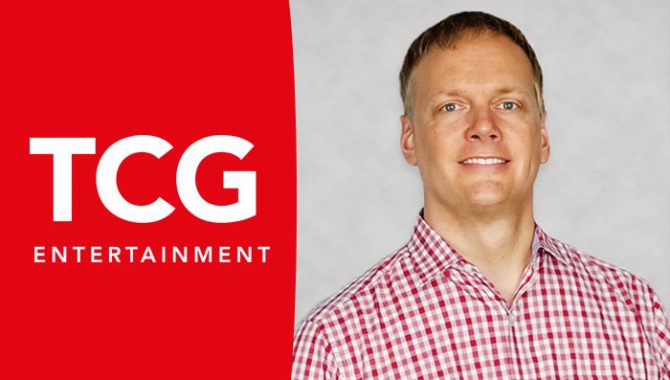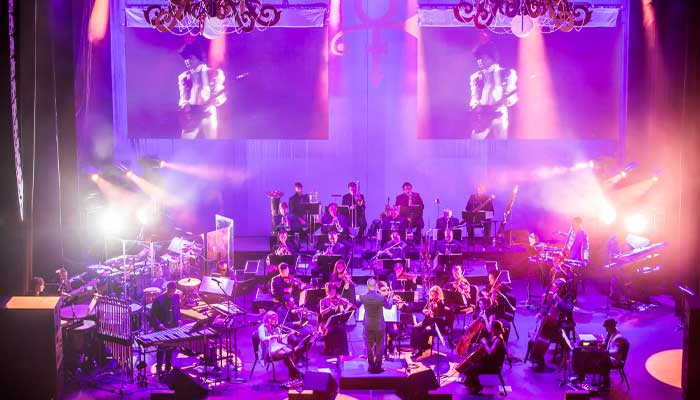—-
To stay in the loop with the latest features, news and interviews from the creative community around licensing, sign up to our weekly newsletter here

Stephen Cook – President & CEO at TCG Entertainment – discusses the envelope-pushing approach behind the DC in Concert series.
Stephen, thanks for making time. To kick us off, how did you find yourself working with brands?
I started my career right out of school with Feld Entertainment, which is Ringling Bros and Barnum & Bailey, and Disney on Ice. From there I went to Madame Tussauds, where I was the second person hired in the US to launch that property in Vegas. Then I went to Universal Studios where I was a brand manager for Universal Orlando for the US and the UK markets. I also did my Masters MBA in Marketing then, so I’ve always been a brand marketing person.
Later in my career I went to Six Flags and then I become the CMO of the Dallas Symphony. That was the first time that I was totally in charge of a brand. We did new creative, new logos and whole rebranding effort.
Then I started TCG, around 13 years ago. Our overarching theme was that we had to own the IP. I’d always been around big brands and I wanted us to build our own IP – but alongside doing deals with other properties. We create IP that’s going to stick and also go out to collaborate with brands.

We’ve seen the experiential and live entertainment market in licensing get a lot of attention in recent years. Have you seen the brand collaboration side of what you do ramp up over time?
Well, Covid destroyed our whole business – it was done! But during that time, while lots of our competitors shut down, we didn’t. We used that time to do deals. I could suddenly get people on the phone that I couldn’t reach before! We went into Covid as a good live entertainment company, but we emerged from it a powerhouse.
I’ve read that part of your vision for TCG was to expand the reach of classical music to a more diverse audience and you recently partnered with Warner Bros. Discovery to launch the DC in Concert series. Is that a good example of what the ‘traditional’ concert sector lacks currently?
Well, back when I was at the Dallas Symphony, film concerts were just starting to come into the market. Since that time they have exploded.. There are over a hundred of them in the market, but there was a lot of old stuff – silent films, etc.. We like to do things differently so with DC in Concert, we wanted to do the new stuff. That’s a big difference. We launched it in London with The Batman when the film was barely a year old.
“The orchestra world says it wants to attract a younger, more diverse audience – well, we’re bringing it!”
We also do what we call ‘plus up’ activity. When you go into the hall there’s music playing, the stage is lit, there’s selfie stations, there’s exclusive merchandise… We bring the composer out afterwards to sign autographs. It all adds to the experience. And there’s more we can do with that,
What struck me with The Batman – and we’ve done about 12 of these shows now – is that the audience is younger that your typical orchestra audience, and it’s totally diverse. Some come in Batman t-shirts and others are in suits and ties. The orchestra world says it wants to attract a younger, more diverse audience – well, we’re bringing it!

Is the orchestra space as ‘old school’ as one might imagine?
It tends to be slow to evolve. A lot of orchestras are stuck doing what they’ve always been doing, but we’re not. We are pushing the envelope pretty aggressively – and we’re being successful with it.
How does that sector view things like the DC in Concert concept?
There’s a bit of snobbery. Look – and I say this respectfully – there’s fiefdoms. They live in their world while we come at things from a brand entertainment point of view. TCG’s first show was called Rewind; it’s all Eighties music with an orchestra. Then we have something like A Night of Symphonic Rock, which we did last weekend with the Long Beach Symphony – 4,000 people came! It’s rock music with an orchestra; it’s great.

I think it’s a demographic thing. If you’re 50 years old, like me, you don’t want to go to a smoky casino or be outside sweating listening to music. Get me a glass of wine and a nice theatre to watch an orchestra play some music – that’s it.
And film scores are the classical music of this time. If someone goes to see The Batman in concert, that’s their orchestra experience. They’re not going to see Mahler; they’re going to see that.
For anyone who maybe hasn’t watched a film accompanied by an orchestra, what does it add to the experience?
Well, some people get so engrossed in the film that they don’t really realise the music is being played live. Other people get engrossed in watching the orchestra – they don’t pay much attention to the film! It’s edutainment because you get a sense for how a score is put together.
“If someone goes to see The Batman in concert, that’s their orchestra experience. They’re not going to see Mahler; they’re going to see that.”
We also do Rocky in Concert and it’s interesting because that movie doesn’t have a lot of music in, but what it does have is iconic. People start cheering when they hear it. It’s a very communal experience. It’s the same in The Batman when Batman is walking up to The Penguin after his car has flipped over. People lose their minds. We missed that during Covid.
You also innovate around classical musical with your Cirque Musica brand. Can you tell us a little about that?
I created Cirque Musica about 10 years ago. It started as a symphony show – we were doing Tchaikovsky’s violin concerto and the violinist flies up into the air as she plays; things like that. We still do those, but it’s evolved. Now we do a massive holiday show that’s hugely popular. We just finished a seven-month run in Mexico with Cirque Musica Querida.

Cirque Musica Querida is a licensed show?
Yes, it was an IP deal I did with Juan Gabriel, the most famous Latin American singer ever. He died about six years ago. Like what Cirque du Soleil did with Michael Jackson and The Beatles, that’s what we did with Juan Gabriel. We brought that to Mexico City and it did 200 shows over seven months. We’re now working on bring that to the US.
It’s a great example of how we can bring our own IP – Cirque Musica – together with another IP to make something special. Using circus arts or a symphony with a brand gives you an interesting canvas to play with. It really works.
What does an artist have to have in order to suit this kind of experience?
Well, a few years ago I did a deal with the Prince estate for 4U The Music of Prince, which was a multimedia symphonic show. We played the Royal Albert Hall with that, which was special because my mum’s English. That was a moment! We’ve just signed a deal with Tony Bennett’s estate and we’re doing a deal with Luther Vandross’ estate.
But to answer your question, it has to be a brand that will sell tickets and that a large audience will want to go to. These shows are expensive to do so it has to appeal to a wide range of people – or it has to be super niche. Covid has divided the market into Harry Styles and Taylor Swift at one end, and the niche stuff at the other, and everything in-between is a bit squishy. The Batman is interesting because it works at both ends – it has a broad appeal but the hardcore fans get into the niche side of it.
Before I let you go, I wanted to ask you about MasterChef Live. How did that come about?
My kids were watching it and that got me into it so I reached out to Endemol Shine. It toured four times before Covid interrupted it. It was a fun mix between a cooking show and a theatre show. We did cooking challenges on stage; it was great. I’ve been approached by every cooking sure you could imagine, but not many could do what we did with MasterChef.

In some ways, MasterChef is a bit of a left-field brand for the live events space. Do you look for IP that will surprise people?
It can be a double-edged sword. I’ve been approached by a big video game brand many times over the years, and I just don’t know how to do it… It would be a surprising one but I don’t know how to make it work on stage. The brand has to fit in the touring space or the experiential space, that’s important.
Stephen, this has been fun. My last question is: What’s your most underrated show?
A Night of Symphonic Hip Hop. We started with Nelly, then we did The Roots, then Wyclef Jean. We’re still doing them, but I’m surprised they haven’t blown up because they’re so good.
Thanks again Stephen. Let’s catch up again soon.
Enter your details to receive Brands Untapped updates & news.